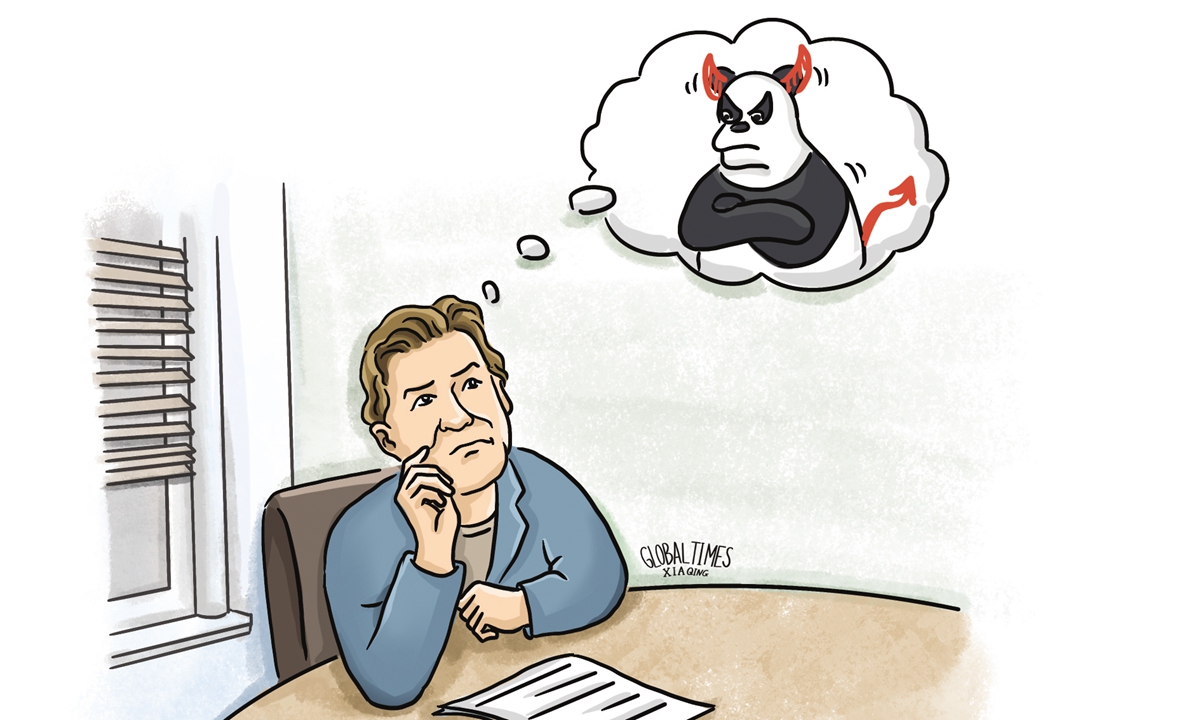
Illustration: Xia Qing/GT
The current US domestic policy atmosphere toward China is obviously in an extremely unhealthy state, even to the point that former US secretary of state Henry Kissinger recently warned US President Joe Biden against "endless confrontation" with China. Think tanks studying China and so-called China experts are increasing, but their influence on the US' China policy is negative. Absurd suggestions rather than rational advices are absorbed into US' China policy, which has become a major feature of how those "China experts" influence US policymaking.
Think tanks and experts in the US system are constrained by the consensus of "strategic competition" and confrontation with China, making it difficult to put forth new ideas that challenge the current hard-line policy. This is the case across most departments of government. These think tanks are not designed to propose new ideas, but to support the existing policy.
The US has the largest number of think tanks in the world. Among them, China-related departments do have some experts and scholars who have a relatively deep understanding of China and could put forward relatively balanced and rational policy recommendations. However, those think tanks or experts who hold a radical view and have strong ideological biases toward China have larger influence. Current domestic public opinion and the political climate on China in the US have marginalized think tanks or experts who tend to be pragmatic and flexible in dealing with China-related affairs. Their influence is not strong enough to reverse public opinion on relevant policy discussions.
In this context, the discussion of China issues in the US has completely lost its bottom line. So-called "China experts" who do not want to understand Chinese history and philosophy but are eager to distort China's intentions and denigrate Chinese politics and foreign policies are prevalent.
The Biden administration pays attention to think tanks, but it is difficult to change the public opinion on China-related issues and the anti-China syndrome within the government. Most of the experts have become parrots who interpret the pathological policies on China left behind by their predecessors. They have lost the will and ability to launch innovative ideas.
At present, most influential experts on China-related issues in the US policymaking field lack understanding and respect for Chinese history and culture. They use Western theories and models to analyze China's diplomacy and views. They even rigidly separate China's current behavior from its history and culture, which has prevented them from understanding and predicting China's diplomacy correctly and failed to correct shortsightedness of US policymakers in formulating China policies.
A significant number of active China experts in US today are too speculative compared to their predecessors such as John King Fairbank, A. Doak Barnett, Ezra Vogel, and David M. Lampton. From the 1940s to the 1990s, most of famous US experts on China had a systematic understanding of Chinese history, culture, and political traditions, and their advocacy of engagement and cooperation with China remained consistent despite US political transitions. They interpreted China's behavior during the adjustments of US' policy toward China, which played a positive role in improving the atmosphere of debate on China policy. The younger generation of experts currently active in think tanks have relatively less understanding of China, and their China-related judgments and interpretations are too "fast-food."
Another interesting phenomenon is that the number of crossover "China experts" in the US has increased, such as John Mearsheimer. Mearsheimer is one of the advocates of the "China threat" theory. His arguments that China will imitate the US in terms of foreign policy have been widely circulated in the academic, media and policy circles of the US and its allies. He has become one of the typical experts that spread the "China threat" theory at the international level.
With China-US relations at a critical juncture, US policy toward China is worrisome. The position of China experts is becoming increasingly awkward. The reality of increasing populism in US domestic politics means that in the coming years it will be very difficult for the US to produce a group of rational policy experts who can truly influence decisions constructively, which is a great tragedy in US policy planning toward China.
The author is professor at the Institute of International Relations of the China Foreign Affairs University. opinion@globaltimes.com.cn




